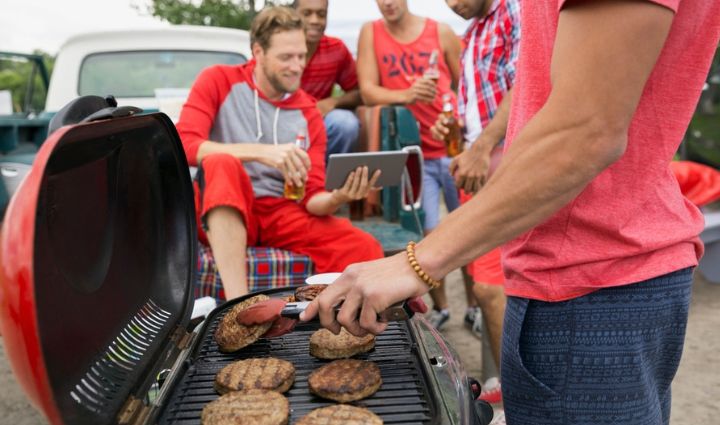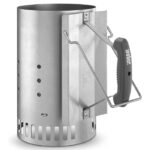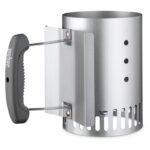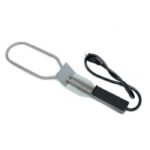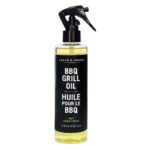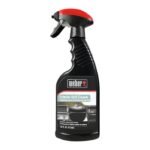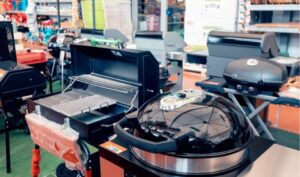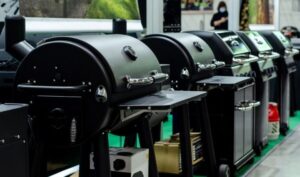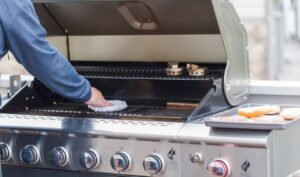Choosing the best portable grill depends on your specific needs and usage. Propane grills are convenient and easy to transport for camping and tailgating.
Anything goes if you’re RVing, but a propane grill might be the easiest option if you have a propane connection. Electric grills are the safest and most compliant with regulations for apartment balconies.
There are so many portable grill options available that choosing the best portable grill can be overwhelming. How do you know which model offers the features you need? How do you even know what you need from a portable grill in the first place? The Grill Spot grill experts are here to help.
The best portable grill depends on your individual circumstances, needs, and wants. So instead of telling you exactly what portable grill to buy, we’re going to serve up some expert advice that will point you in the right direction.
In this post, we will take a look at factors you need to consider so you can choose the best portable grill for your needs. We’ll cover types of portable grills, help you understand your grilling needs, and offer our advice about the best portable grills for different uses, including:
- The best portable grill for camping
- The best portable grill for your RV
- The best grill for an apartment balcony
- The best tailgating grill
Let’s begin.
Types of Portable Grills
To choose the best portable grill, you first need to know what types of portable grills are available.
Like regular full-size grills, portable grills are available in numerous fuel types. Let’s dig in to the most popular options:
- Portable Gas Grills: Portable gas grills are fueled by propane. They are the easiest to use, are one of the most convenient options in terms of portability, and they’re also great for temperature control. All you need is a full tank and you’re ready to grill! If you are keen on quality, Coleman and Weber are the best-known portable grills, and for good reason. The Weber Q 1200 gets top marks from Food & Wine, Wirecutter, and Serious Eats, and is one of the few portable grills that reviewers have reached a consensus on. Napoleon’s portable model the Travel Q is also worth noting for its popularity.
- Charcoal Grills: Portable charcoal grills are slightly less common than portable gas grills these days, but there are some good options available if that classic charcoal flavor is non-negotiable. In particular, Weber’s Smokey Joe and Go-Anywhere models are well known for their quality. Setup and cleanup can take longer than other types of fuel, but there are some models you can set up and grill on in 15 minutes, so don’t be dissuaded if you’re a loyal charcoal griller. Just make sure you have a charcoal chimney or electric starter handy for added convenience.
Shop for charcoal grilling tools:
- Electric Grills: For ease of transportation and use in small spaces, nothing beats a portable electric grill. Electric grills are typically the best grill for an apartment balcony and the best portable grill for use in RVs because they require a plug for power, nicely sidestep the issue of apartment regulations.
Understanding Your Grilling Needs
Besides fuel type, there are a few additional factors to consider when choosing the best portable grill:
- Budget: Due to their compact size, portable grills tend to be on the lower end of the grill price range—even when they are made with high-quality materials and offer additional features. That said, you can still expect to pay between $100-$430 for a good quality portable gas grill and between $80-$430 for a good quality portable charcoal grill. Portable electric grills can be found in a similar price range to portable gas grills, but sometimes they are even pricier than that. However, you don’t need to factor in the cost of fuel (e.g. propane or charcoal) each time you use it, so you may find some savings there.
- Cooking Surface Area: Portable grills generally all have a similar cooking surface area—that’s why they’re portable. Some are slightly larger, but if you’re looking for a grill that’s easy to carry, you can expect to sacrifice space for easier portability (or portability for more grilling space). To determine the right size for you, consider the number of people you typically cook for, and remember that a smaller grilling space isn’t necessarily a bad thing—it just means it will take a few minutes longer for everyone to get their food.
- Heat Output: Heat output is measured in BTUs (British Thermal Units), but this rating isn’t necessarily the best indicator of whether a grill will be any good, especially with modern technology making portable grills more efficient and better at retaining heat. However, the BTU rating is still a good indication of how much heat can be generated by a burner at its maximum output, and it will give you a rough idea of how much fuel your barbecue will use in a given period of time. For a portable gas grill, you should look for something with at least 9,000 BTUs.
- Build Quality and Durability: Finding the right balance between high-quality materials and how portable the grill is isn’t especially difficult these days. While we often associate weight with quality and durability—and usually for good reason—many modern materials strike a good balance between strength and low weight. For guaranteed longevity, you can’t go wrong with stainless steel or cast iron but know that they will generally add weight. A portable grill that offers replacement parts is also a good sign because it means you can repair it in the event that something breaks down rather than needing to replace the entire grill.
- Ease of Assembly and Disassembly: A portable grill should be simple to set up and easy to disassemble so that grilling outside the home can be the pleasure it is. No one wants to spend an endless amount of time getting their grill set up after arriving at their destination. And when you’re ready to leave, you want to leave—especially if you’re at the beach and your toddler has absolutely had it.
- Clean-up: A portable grill that offers easy clean up is important because you need to clean a portable grill after pretty much every use—you don’t want to put a filthy grill back in your car where you will have to worry about it greasing up the trunk.
Shop for grill cleaning tools:
Defining Your Portable Grilling Needs
Asking yourself the following questions and answering them honestly will help you narrow down what factors are most important so you can choose the best portable grill:
- What will you be doing with your portable grill? Will you be camping, tailgating, going on picnics, BBQing on the beach, or something else?
- How far will the grill need to be transported from the vehicle? Does it need wheels?
- Does it need legs or will it be used primarily on a counter, table, or tailgate?
- How easy is it to set up and pack away the grill?
- Can one person set it up in under five minutes?
- How long does it take to heat up?
- How many people will your grilling activities routinely involve?
- How big is your vehicle (car, SUV, pick-up truck, RV) or the area in which you will be using it?
- How often will you be using your grill?
- How easy to move does it need to be? Will you actually be transporting it and grilling in different spots or do you simply need a small grill?
- How difficult is clean-up?
Choosing the Best Portable Grill
The best portable grill for camping
Fuel Type: Propane
We recommend propane portable grills for camping for a few reasons: propane is easier to transport than charcoal, propane grills heat up quicker, and they are easier to maintain the right temperature. Plus, you can get that classic charcoal flavor by cooking right over the fire.
The best portable grill for camping will be lightweight, have handles to make carrying as easy as possible, or will fold down for easy transport—you don’t want your grill to take up half your trunk!
The best portable grill for the RV
Fuel Type: Any
You can use just about any fuel type when RVing. Many RVs come with a propane connection, so a propane grill might be your easiest option, but if you have a generator, you can also use an electric grill. And of course, charcoal is always available too!
Ease of use is the primary factor to consider when choosing the best portable grill for your RV. RVing often includes frequent stops, so you want a grill that’s easy to set up and take down (compared to tent camping, where you typically set up camp and stay put for a couple of days).
You may have more storage space in your RV—and more people to feed—so you could also consider getting a larger portable grill.
The best grill for an apartment balcony
Fuel Type: Electric
Electric grills don’t produce flames and are more likely to comply with apartment fire safety regulations around the use and transportation of propane (i.e. in the elevator)
Since apartment grills are less likely to move around to different locations, you can go with something a bit larger. The best portable grill for an apartment balcony will also have side shelves or a cart to make grilling easier.
The best tailgating grill
Fuel Type: Propane
Propane portable grills win the title for best tailgating grill as well. Electricity can be difficult to come by in a parking lot, and some stadiums don’t permit charcoal. Propane is also easier to use, with faster heating times and less effort required to maintain the right temperature. Charcoal may provide better flavor, but it’s slower to heat and requires more effort to clean.
If you have space in your vehicle, consider getting a slightly larger portable tailgating grill, especially if you plan to feed a crowd.
Get Grilling
Choosing the right portable grill isn’t always easy in a sea of options, but knowing what you are going to use it for, the number of people you will be cooking for regularly, and the type of fuel you prefer can help you narrow down your options.
Learn more about buying a grill in our Ultimate Gas Grill Buying Guide.

